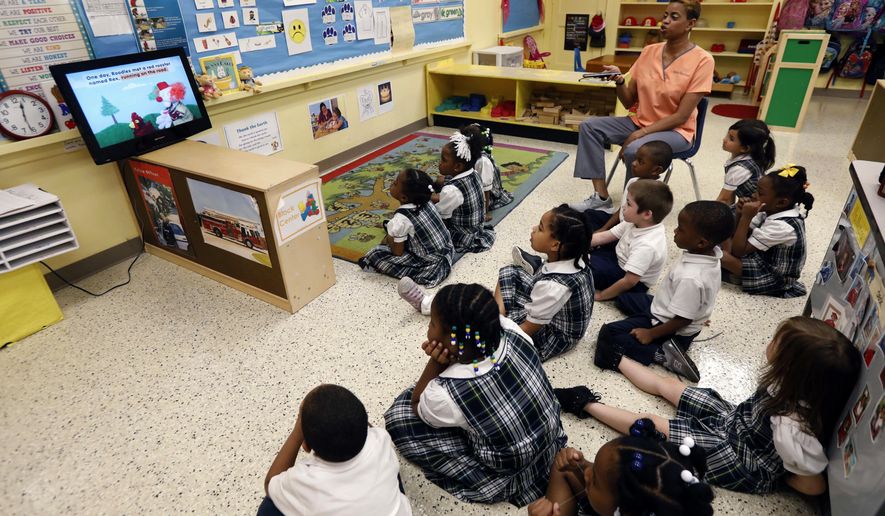The D.C. Council plans to spend $1.73 billion on education next fiscal year, a sum deemed insufficient by some advocacy groups.
Marlana Wallace, a researcher at the anti-poverty think tank D.C. Fiscal Policy Institute, said that recent budgets for D.C. Public Schools have been “arbitrary” and “not connected to what’s really needed to provide quality education,” noting that per-student funding remains $942 short of 2013 recommended levels in the current budget.
“When city budgets consistently fail to provide enough resources to schools, teachers, students, families and the whole District suffers for it,” Ms. Wallace said in an email to The Washington Times.
The $1.73 billion outlay for education is part of the $14.4 million budget for fiscal 2019 that the D.C. Council gave preliminary approval to on Tuesday. It would provide $94 million more for the District’s public and charter schools than the current budget.
It also would provide $4.3 million to effect three reforms in special education — assessing developmental delays in toddlers sooner, evaluating special needs students earlier and offering life-planning support for high school students.
Education advocates applauded the funding for special education but pointed out that these reforms have been awaiting funding for the last four years.
“These changes will help, but we need to be clear: Our education system is continuing to fail to educate these students,” Judy Berman, director of education research organization DC Appleseed, said in an email, noting D.C. special needs students’ low proficiency rates in reading (6 percent) and math (7 percent).
Special needs students are a clear priority in the 2019 budget, which offers an additional $4.4 million to guarantee that each school has a full-time registered nurse or licensed practical nurse on staff. The budget also provides $3 million to the School Mental Health Program, though Ms. Wallace said that’s $319,000 short of the amount requested by school officials.
The council also included $450,000 for schools to stop suspending or expelling students for nonviolent offenses and instead use “restorative justice” practices such as conflict mediation.
“We think that will lead to more kids in school, better educational outcomes, less discrimination and overall will improve for the schools,” said Sharra Greer, policy director of the Children’s Law Center.
According to the Office of the State Superintendent of Education (OSSE), black children in the District were 7.7 times more likely to be given an out-of-school suspension than their white peers in 2016 and 2017.
In addition, schools also are 3.4 times more likely to suspend black students in the District several times compared to white students, and black students account for 95.3 percent of all expulsions, despite only making up 67.6 percent of the city’s student population.
“We’re not even looking at the non-documented suspensions,” Ms. Greer said.
In another schools outlay, the council set aside $500,000 to fund an independent education data watchdog program amid growing public distrust of school data following scandals over inflated graduation rates and widespread residency fraud.
Legislation to form the watchdog program has yet to pass a vote in the Education Committee, but it has drawn wide support from the public and D.C. Auditor Kathy Patterson.
Opposing the proposed program is councilmember David Grosso, at-large Democrat and chairman of the Education Committee. Saying he is “skeptical” of duplicating OSSE’s data research arm, Mr. Grosso has argued that “we should focus the dollars and energy that would go into creating such an entity toward further strengthening OSSE’s abilities and insulating the agency from political interference.”
The council will vote for a second and final time on the budget on May 29, then advance the spending plan to Mayor Muriel Bowser.
• Julia Airey can be reached at jairey@washingtontimes.com.




Please read our comment policy before commenting.